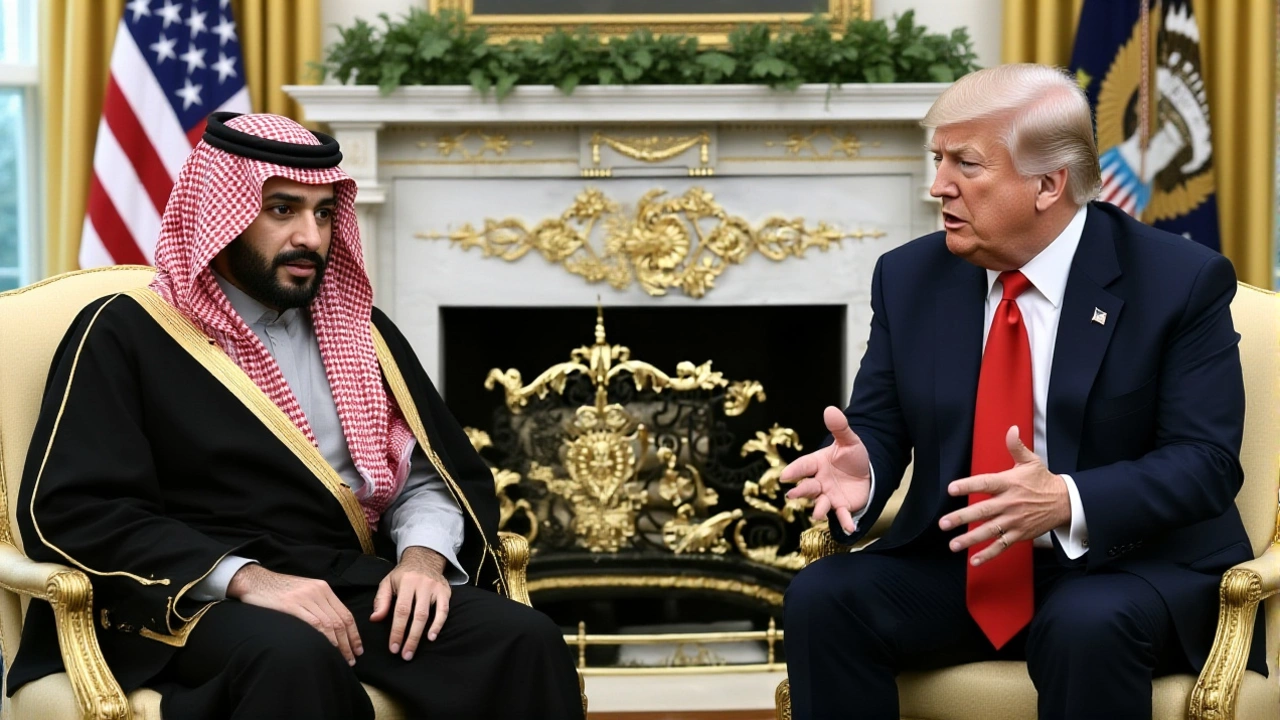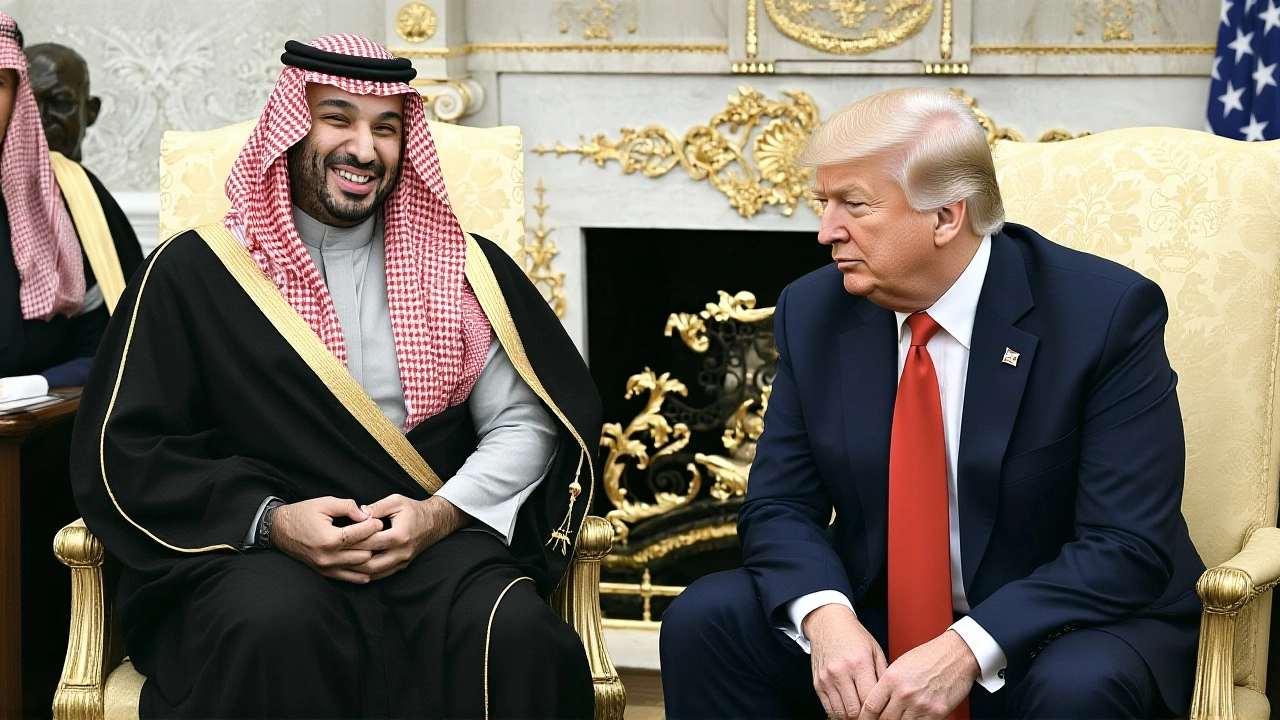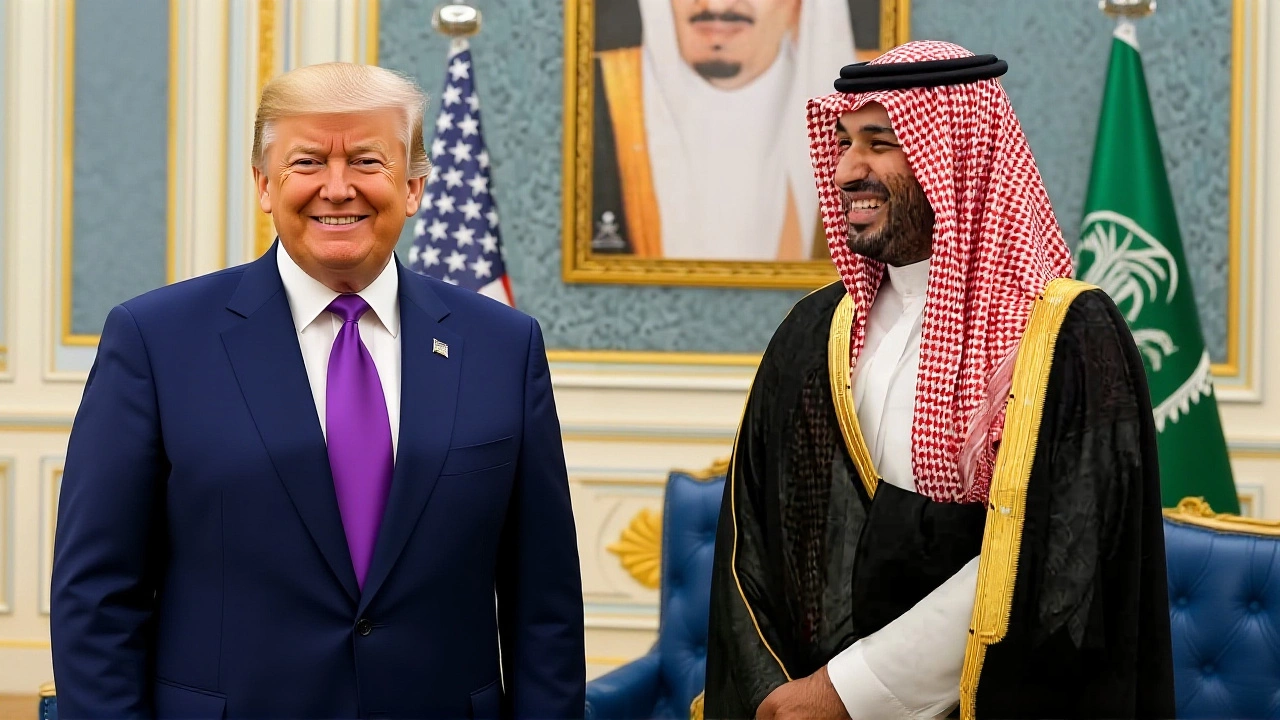
- oleh Aditya Pranata
- nyala 20 Nov, 2025
When Donald J. Trump welcomed Crown Prince Mohammed bin Salman to the White House on November 19, 2025, he didn’t just offer a red carpet—he offered a shield. In front of ABC News reporter David Muir, Trump dismissed the Central Intelligence Agency’s long-standing conclusion that the crown prince approved the 2018 killing of journalist Jamal Khashoggi. "He had no knowledge," Trump insisted, even as the Office of the Director of National Intelligence had formally declassified its assessment in 2021: that the crown prince, with total control over Saudi decision-making, authorized a brutal operation that ended Khashoggi’s life inside the Saudi consulate in Istanbul.
"A Painful Mistake"—But No Accountability
Crown Prince Mohammed bin Salman, now 40 and the de facto ruler of Saudi Arabia, called Khashoggi’s murder "painful" and a "huge mistake" during the meeting. But those words carried the weight of a PR line, not a confession. He added that Saudi Arabia had taken "all the right steps afterwards"—a reference to a 2019 trial that sentenced five agents to death (later commuted to 20 years) and acquitted the rest, including key figures like Maher Mutreb and Saud al-Qahtani, who were directly tied to the crown prince’s inner circle. The international community called it a farce. Now, with a new conviction overturned in September 2025, there’s literally no one left serving time for the crime.That’s what made the moment in the Oval Office so chilling. Trump, serving his second non-consecutive term as the 47th president, didn’t just ignore the evidence—he weaponized it. "I have total confidence in his statements," Trump told Muir. It wasn’t just denial. It was endorsement.
The $23.5 Billion Deal That Changed Everything
The meeting wasn’t just about words. It was about weapons. Trump announced plans to sell Saudi Arabia the first-ever batch of F-35 fighter jets—a $23.5 billion deal, the largest international arms sale by Lockheed Martin Corporation since 2020. The jets aren’t just machines. They’re symbols of strategic alignment. And they come with a price tag that includes silence on human rights.Under the Arms Export Control Act, the sale must be notified to Congress and undergo a 30-day review by the Senate Foreign Relations Committee and the House Foreign Affairs Committee. But history shows this is a formality. In 2018, Congress tried to block arms sales over Khashoggi’s murder—and Trump vetoed the resolution. With Republicans holding a narrow majority, another veto-proof override seems unlikely. The message is clear: money talks louder than murder.

Who’s Still Speaking Up?
Not everyone stayed quiet. Hatice Cengiz, Khashoggi’s widow and a Turkish academic, spoke to Sky News moments after the meeting. "It’s shameful," she said, "to ask reporters about my husband’s murder during a state visit. His death isn’t a talking point—it’s a crime that demands justice." Her words echoed across human rights circles.Human Rights Watch issued a blistering statement: "Trump’s remarks are a green light for autocrats to murder dissidents with impunity." They pointed to 12 other cases since 2018 where journalists, activists, and critics vanished or were killed under similar circumstances. Meanwhile, the State Department’s 2024 report confirmed Saudi Arabia executed 196 people last year—the highest number since 2019—and banned 47 journalists from leaving the country.
Why This Isn’t Just About Saudi Arabia
This isn’t an isolated incident. It’s a pattern. When the U.S. prioritizes arms deals over accountability, it tells the world that power trumps principle. Countries like Egypt, the UAE, and Hungary have taken note. Dissidents abroad now fear not just repression at home—but silence from Washington when they’re targeted overseas.What’s worse? The CIA’s original assessment, confirmed by multiple intelligence analysts under both Trump and Biden, remains unchallenged. Gina Haspel, then-CIA director, briefed Trump in 2018. He chose to ignore it. Now, years later, he’s doing it again. The agency, headquartered in Langley, Virginia, has stood by its findings. But in the Oval Office, facts don’t matter as much as alliances.

What Happens Next?
The F-35 deal enters its 30-day congressional review window on November 20, 2025. Lawmakers have until December 20 to act. Some Democratic senators have vowed to introduce a resolution blocking the sale. But without bipartisan support, it’s unlikely to pass. Meanwhile, the Kingdom of Saudi Arabia is preparing for its next move: a $12 billion investment in U.S. tech infrastructure, including AI data centers and semiconductor partnerships. The economic ties are deepening. So are the moral compromises.And what of Jamal Khashoggi? His final words, recorded on his phone inside the consulate, were never released. But his legacy lives—in the silence of the White House, in the roar of F-35 engines being readied for delivery, and in the quiet grief of a widow who still waits for justice.
Frequently Asked Questions
Why did Trump ignore the CIA’s findings on Khashoggi’s murder?
Trump has consistently prioritized U.S.-Saudi strategic and economic ties over human rights concerns. During his first term, he blocked sanctions under the Magnitsky Act and dismissed CIA briefings, citing a $110 billion arms deal. In 2025, the $23.5 billion F-35 sale reinforces this pattern—his administration views Saudi Arabia as a critical counterweight to Iran and a major buyer of U.S. defense systems, making accountability politically inconvenient.
Has Saudi Arabia ever been held legally accountable for Khashoggi’s killing?
No. Saudi courts convicted 11 individuals in 2019, but only five received prison sentences—later reduced to 20 years. Two key figures tied directly to the crown prince, Maher Mutreb and Saud al-Qahtani, were acquitted. In September 2025, the last remaining conviction—an intelligence official’s 10-year sentence—was overturned. No one has been punished for ordering or planning the murder, and the crown prince remains untouched by any legal process.
What does the F-35 sale mean for U.S. national security?
The F-35 is the most advanced stealth fighter in the world. Selling it to Saudi Arabia raises serious proliferation risks. Experts warn that sensitive technology could be compromised through third-party vendors, cyber intrusions, or even reverse engineering. The Pentagon has previously restricted F-35 sales to nations with poor cybersecurity records. Saudi Arabia’s 2024 cyberattack on U.S. defense contractors, confirmed by the Department of Defense, makes this sale especially controversial.
How has the international community responded to Trump’s stance?
European allies, including Germany and France, have expressed private concern, though none have publicly condemned the deal. The United Nations Human Rights Council called the White House meeting "a setback for global accountability." Turkey, where Khashoggi was killed, summoned the U.S. ambassador for a formal protest. Meanwhile, the European Parliament has signaled it may delay a pending trade agreement with Saudi Arabia unless human rights conditions are reinstated.
Is there any legal path to hold Crown Prince Mohammed bin Salman accountable?
Yes—but not in the U.S. The International Criminal Court (ICC) has jurisdiction over crimes against humanity, and Khashoggi’s killing could qualify under the Rome Statute. Turkey has filed evidence with the ICC since 2019. However, the U.S. doesn’t recognize the ICC’s authority, and Trump’s administration has actively blocked any international investigations. Without U.S. cooperation, prosecution remains unlikely, even if the ICC opens a formal inquiry.
What role did the CIA play in uncovering the truth?
The CIA intercepted communications between Saudi officials before and after the murder, including a call from Maher Mutreb to the crown prince’s office immediately after Khashoggi’s death. They also analyzed biometric data from the consulate’s security cameras and traced the travel of the 15-member hit team. Director Gina Haspel personally briefed Trump in November 2018, concluding with "high confidence" that the crown prince ordered the killing. The CIA’s findings were later corroborated by the ODNI and multiple allied intelligence services.